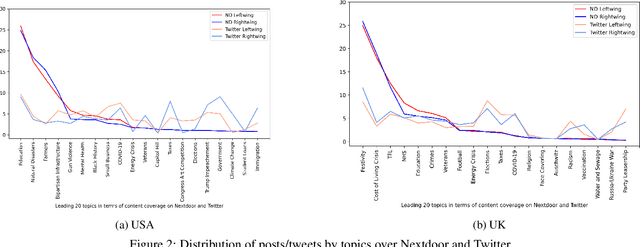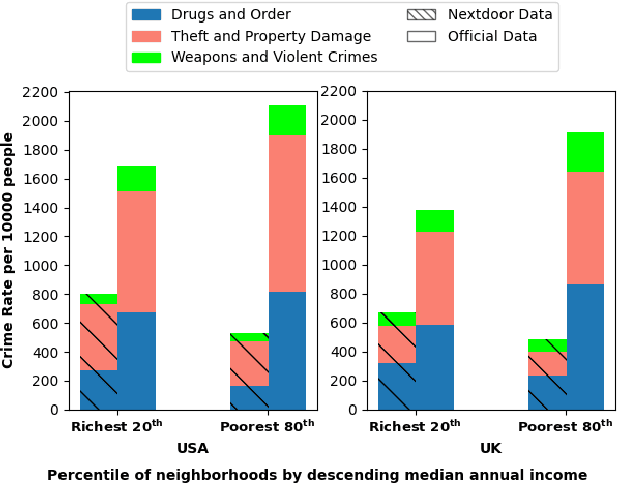Waleed Iqbal
How Similar Are Elected Politicians and Their Constituents? Quantitative Evidence From Online Social Network
Jul 03, 2024



Abstract:How similar are politicians to those who vote for them? This is a critical question at the heart of democratic representation and particularly relevant at times when political dissatisfaction and populism are on the rise. To answer this question we compare the online discourse of elected politicians and their constituents. We collect a two and a half years (September 2020 - February 2023) constituency-level dataset for USA and UK that includes: (i) the Twitter timelines (5.6 Million tweets) of elected political representatives (595 UK Members of Parliament and 433 USA Representatives), (ii) the Nextdoor posts (21.8 Million posts) of the constituency (98.4% USA and 91.5% UK constituencies). We find that elected politicians tend to be equally similar to their constituents in terms of content and style regardless of whether a constituency elects a right or left-wing politician. The size of the electoral victory and the level of income of a constituency shows a nuanced picture. The narrower the electoral victory, the more similar the style and the more dissimilar the content is. The lower the income of a constituency, the more similar the content is. In terms of style, poorer constituencies tend to have a more similar sentiment and more dissimilar psychological text traits (i.e. measured with LIWC categories).
Lady and the Tramp Nextdoor: Online Manifestations of Economic Inequalities in the Nextdoor Social Network
Apr 26, 2023



Abstract:From health to education, income impacts a huge range of life choices. Earlier research has leveraged data from online social networks to study precisely this impact. In this paper, we ask the opposite question: do different levels of income result in different online behaviors? We demonstrate it does. We present the first large-scale study of Nextdoor, a popular location-based social network. We collect 2.6 Million posts from 64,283 neighborhoods in the United States and 3,325 neighborhoods in the United Kingdom, to examine whether online discourse reflects the income and income inequality of a neighborhood. We show that posts from neighborhoods with different incomes indeed differ, e.g. richer neighborhoods have a more positive sentiment and discuss crimes more, even though their actual crime rates are much lower. We then show that user-generated content can predict both income and inequality. We train multiple machine learning models and predict both income (R-squared=0.841) and inequality (R-squared=0.77).
 Add to Chrome
Add to Chrome Add to Firefox
Add to Firefox Add to Edge
Add to Edge